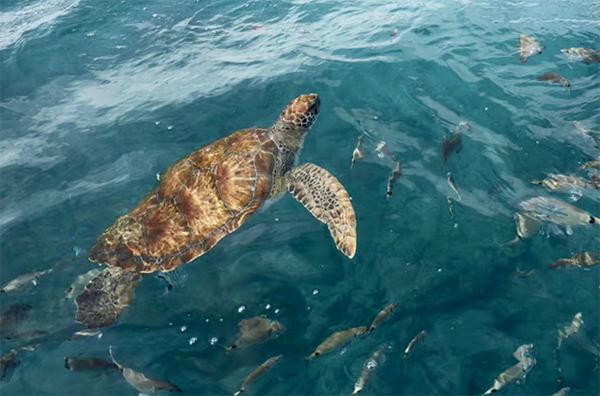
The world’s oceans, covering an expansive 70% of our planet’s surface, are a lifeline for humanity and a cornerstone of Earth’s health. They are not just vast bodies of water; they are dynamic systems that regulate our climate, provide livelihoods for millions, and are home to a diverse array of marine life. In contemporary times, these critical ecosystems are under siege. Human activities, ranging from pollution to overfishing, are posing serious threats to their health and sustainability.
The benefits of oceans for humanity is as important as its very existence. Oceans absorb about 30% of carbon dioxide produced by humans, buffering the impacts of global warming. They are home to a diverse range of species, with scientists estimating that 91% of ocean species have yet to be classified. Over 3 billion people depend on marine and coastal biodiversity for their livelihoods. These figures underscore the immense value of our oceans and the urgent need for robust marine conservation efforts. The state of our oceans reflects the state of our planet – to protect them is to protect ourselves.
The decline in ocean health due to climate change is alarming. Overfishing has led to the depletion of many fish stocks, threatening coastal communities, and damaging marine ecosystems. The Food and Agriculture Organization (FAO) reports that about 90% of the world’s fish stocks are overexploited. Pollution from industrial and urban runoff, oil spills, and plastic waste also pose serious threats to marine life. Climate change has resulted in the ocean absorbing about 90% of the heat generated by rising emissions, leading to ocean warming, sea-level rise, marine heatwaves, and ocean acidification. Sea-level rise has accelerated due to increasing ice loss in the world’s polar regions, exacerbating extreme events such as deadly storm surges and coastal hazards like flooding, erosion, and landslides. Marine heatwaves have doubled in frequency and have led to widespread coral bleaching and reef degradation. Increased carbon dioxide in the atmosphere leads to more being absorbed by the oceans, causing ocean acidification. Rising temperatures increase the risk of irreversible loss of marine and coastal ecosystems, harming marine biodiversity. These points highlight the urgent need for comprehensive and effective measures to mitigate the impacts of climate change on our oceans.

The Intergovernmental Panel on Climate Change (IPCC) and other international organizations such as the United Nations (UN) have issued dire warnings about the accelerating impact of climate change on our oceans. The ocean, which has absorbed about 90 percent of the heat generated by rising emissions, is warming at an unprecedented rate. This warming is not only threatening marine life but also leading to more frequent and severe weather events. Marine heatwaves have doubled in frequency and have become longer-lasting, more intense, and extensive. These heatwaves are causing widespread coral bleaching and reef degradation. Rising temperatures increase the risk of irreversible loss of marine and coastal ecosystems. Sea-level rise has accelerated in recent decades due to increasing ice loss in the world’s polar regions. This rise, along with intensifying tropical cyclones, has exacerbated extreme events such as deadly storm surges and coastal hazards such as flooding, erosion, and landslides. These events, which historically occurred once per century, are now projected to occur at least once a year in many locations.
The consequences of these changes are far-reaching, affecting not just marine biodiversity but also human lives and livelihoods. Coastal communities around the world are particularly vulnerable, with almost 2 billion people living in half of the world’s megacities that are coastal. Furthermore, nearly half of the world’s population depends on fish for protein, and almost 60 million people work in fisheries and the aquaculture sector worldwide. These consequences of climate change on oceans, such as sea-level rise, further enhance the fragility of coastal ecosystems and human habitats. The warnings from the IPCC, UN, and other international organizations underscore the urgent need for global action to mitigate these impacts.
To effectively address the multifaceted challenges that our oceans face, it is imperative to adopt a holistic strategy encompassing conservation, sustainable management, and international cooperation. The establishment of Marine Protected Areas (MPAs), which limit fishing and other extractive activities, has demonstrated success in the revitalization and preservation of marine ecosystems. As per the International Union for Conservation of Nature’s 2010 report, there are over 16,000 MPAs globally, safeguarding 7.6% of our oceans. This suggests that expanding the network of MPAs could be a promising approach to enhance ocean conservation efforts. By leveraging these successful practices, we can work towards a future where our oceans thrive in harmony with human activity.
Given the intricate interconnectivity of marine ecosystems, it is crucial to underscore the necessity of global collaboration. The United Nations Sustainable Development Goal 14 (Life Below Water) highlights the significance of conserving and sustainably utilizing the oceans, seas, and marine resources. Furthermore, international accords such as the Paris Agreement and the Biodiversity Agreement acknowledge the urgency of addressing climate change and safeguarding biodiversity. This suggests that a concerted global effort is required to scale up ocean conservation practices. By fostering international cooperation and joint efforts, we can amplify the impact of these practices, thereby ensuring the preservation of our oceans for the benefit of humanity and the planet. This approach not only aligns with global sustainability goals but also paves the way for a healthier and more resilient marine ecosystem.
The vitality of our oceans reflects the overall health of our planet. As we grapple with formidable challenges such as climate change, overfishing, and pollution, the call for unified global action has never been more pressing. Insights driven by data underscore the immediate necessity for ocean conservation, emphasizing the significance of sustainable practices, conservation initiatives, and international collaboration. By prioritizing the health of our oceans, we are not only safeguarding the rich biodiversity within them but also securing a sustainable future for generations to come. In essence, conserving our oceans is tantamount to ensuring the survival and prosperity of humanity on Earth. Our collective efforts today will determine the legacy we leave behind for the future inhabitants of our planet. Let’s strive to make it a legacy of stewardship, sustainability, and respect for all life on Earth.












Social Profiles